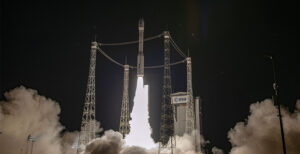In addition to the launch provider’s Small Spacecraft Mission Service that debuted aboard a Vega launch vehicle in September, Arianespace will introduce its Multi-Launch Service, a rideshare offering that will be carried aboard its next-generation Ariane 6 launch vehicle.
The winner of the Destination: A Better Life on Earth competition will win integration and launch services aboard a future Arianespace rideshare mission offering one of the two new services.
In order to be eligible for the free ride to space, participating teams are required to submit a mission proposal aimed at improving life on Earth or advancing human knowledge. Additional selection criteria include that the payload be no larger than a single-unit cubesat unit measuring 10 centimeters a side.
Submissions for the competition are already open and close May 14. Five finalists will be selected by an Arianespace panel with the winner being announced at an event June 16 during the opening day of VivaTech.
Arianespace is not the only organization offering a free ride to space.
In October, the International Astronautical Federation (IAF), a space advocacy group based in Paris, launched the Space Universities CubeSat Challenge in conjunction with the Chinese Society of Astronautics and the Dalian University of Technology.
The Space Universities CubeSat Challenge will be held every two years with the winning team receiving free integration and launch services aboard a China Academy of Launch Vehicle Technology-built Long March rocket.
All IAF member universities and interested university teams that apply for IAF membership are eligible to enter the challenge.
Unlike the Arianespace competition, the IAF challenge offers participants the chance to design within the larger triple-unit cubesat form factor measuring 10 cm x 10 cm x 30 cm. Participating teams are required to propose innovative mission concepts that could include missions to the moon or Mars.
Applications for the Space Universities CubeSat Challenge are open until June 15. The winner will be announced at the 72nd International Astronautical Congress in Dubai later this year.



